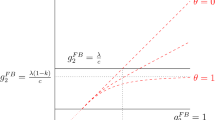Abstract
This paper deals with two questions which have recentlyreceived considerable attention in both the political debateand the academic literature: First, are fiscal programs largeror smaller when they are (de-)centralized? Second, should suchprograms be (de-)centralized? We answer these questions withina politico-economic model in which voters choose the parametersof a linear income tax taking into account how taxes affect laborsupply and migration decisions. It is shown that a decentralizedpolitical system may lead to a smaller government budget. Theconcept of a veil of ignorance is used to analyze the desirabilityof a decentralized system. It is argued that a decentralizedsystem is preferred under the veil of ignorance only if individualsare not too risk-averse and the income distribution is not toopolarized.
Similar content being viewed by others
References
Bolton, P., and G. Roland. (1996). "Distributional Conflicts, Factor Mobility, and Political Integration." American Economic Review, Papers and Proceedings86, 99–104.
Buchanan, J. M., and G. Tullock. (1962). The Calculus of Consent. Ann Arbor: University of Michigan Press.
Casella, A., and A. J. Venables (eds). (1996). "The Domain of the State." Special Issue, European Economic Review40.
Epple, D., R. Filimon, and T. Romer. (1984). "Equilibrium Among Local Jurisdictions: Toward an Integrated Treatment of Voting and Residential Choice." Journal of Public Economics24, 281–308.
Epple, D., and T. Romer. (1991). "Mobility and Redistribution." Journal of Political Economy99, 828–858.
Harsanyi, J. C. (1955). "Cardinal Welfare, Individualistic Ethics, and Interpersonal Comparisons of Utility." Journal of Political Economy63, 309–321.
Kehoe, P. J. (1989). "Policy Cooperation Among Benevolent Governments May Be Undesirable." Review of Economic Studies, 289–296.
Meltzer, A. H., and S. F. Richard. (1981). "A Rational Theory of the Size Government." Journal of Political Economy89, 914–927.
Oates, W. E. (1972). Fiscal Federalism. New York: Harcourt Brace Jovanovich.
Persson, T., and G. Tabellini. (1994). "Does Centralization Increase the Size of Government?" European Economic Review38, 765–773.
Rawls, J. A. (1971). A Theory of Justice. Cambridge, Mass.: Belknap Press.
Roberts, K. W. S. (1977). "Voting Over Income Tax Schedules." Journal of Public Economics8, 329–340.
Rosen, H. S. (1995). Public Finance, 4th edition. Chicago: Irwin.
Wildasin, D. (1991). "Income Redistribution in a Common Labor Market." American Economic Review81, 757–774.
Author information
Authors and Affiliations
Rights and permissions
About this article
Cite this article
Janeba, E., Raff, H. Should the Power to Redistribute Income be (De-)Centralized? An Example. International Tax and Public Finance 4, 453–461 (1997). https://doi.org/10.1023/A:1008608914395
Issue Date:
DOI: https://doi.org/10.1023/A:1008608914395




